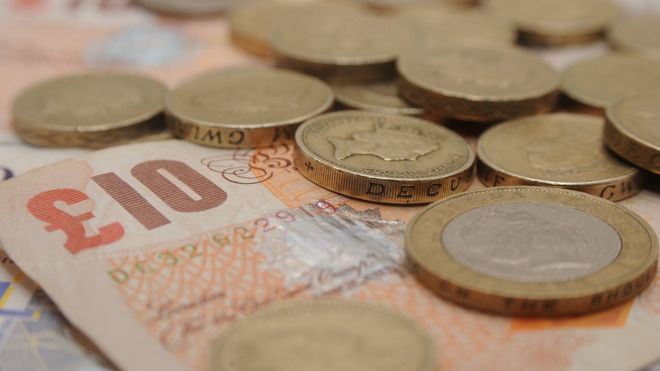
The pound has recovered some of its losses with analysts attributing the gains to the promise of a Commons debate on the Brexit process.
The pound is trading 0.8% higher from Tuesday's close at $1.2222, but down from its best levels for the day.
Sterling has been sliding since Mrs May announced on 2 October that the formal Brexit negotiation process would start by the end of March 2017.
Traders sold the pound on fears of the impact of leaving the single market.
However, MPs have been demanding to scrutinise the plan to leave the European Union before that date, and on Wednesday the government agreed there should be a "full and transparent debate".
But it added that the process should not "undermine" the government's negotiating position.
"After weeks of tough rhetoric pushing sterling into a trading environment closer to an emerging market currency, the government may aim to stabilise markets, with its rhetoric and suggestions now possibly shifting in tone," said Morgan Stanley's head of currency strategy, Hans Redeker.
"However, there is a fine line to walk as May's Conservative Party wants a clean split from Europe. In addition, giving in too much, even before Article 50 negotiations have started, shifts the negotiation advantage towards the EU. Hence, the pound's rebound should be limited and followed by a decline," he added.
Other analysts warned of further volatility ahead.
"It would appear that trying to find a floor for the pound is going to be difficult in the short term, simply due to the amount of political uncertainty being generated on both sides of the Channel, as both sides dance on the edge of the volcano, in laying out their negotiating positions, which for now appear a long way apart," said Michael Hewson, chief market analyst at CMC Markets.
Neil Wilson, markets analyst at ETX Capital said: "If traders think the mood is turning bullish for the pound, they're mistaken. The bears are still very much in control and this relief rally looks like a dead cat bounce. It could just be a short pause before sterling takes another leg lower towards $1.20."
Shares slide
The FTSE 100 share index has fallen back after a recent strong run, which has been partly helped by the weaker pound.
The fall in the pound has boosted the FTSE 100 as many of the companies in the index generate most of their revenues abroad.
A weaker pound means overseas revenues are worth more when they are converted back into sterling.
On Tuesday, the benchmark index hit an intraday high of 7,129.83, and on Monday the fell just short of registering a record close.
On Wednesday afternoon it was down 27.69 points at 7,043.19.
Analysis: Kamal Ahmed, BBC economics editor
Why does the fall of the pound matter?
On the upside, it matters for exporters which are boosted as their goods are far cheaper on foreign markets.
It matters for multinational companies like pharmaceutical firms which earn much of their income in dollars. It matters for the tourism industry in the UK, as foreign visitors flock here for bargains and good value holidays.
On the downside, it matters for tourists travelling abroad who will find everything they buy much more expensive.
It matters for the food and fuel this country imports as it becomes more expensive. It matters for inflation, as the rise in import costs feeds through to businesses and the High Street.
And remember, it does not need much of a rise in inflation to wipe out real income growth which at present is running at around 2%. If real incomes start falling, that is when the fall in sterling becomes a truly political issue.
Because the pound in your pocket will actually be worth less.
No comments:
Post a Comment